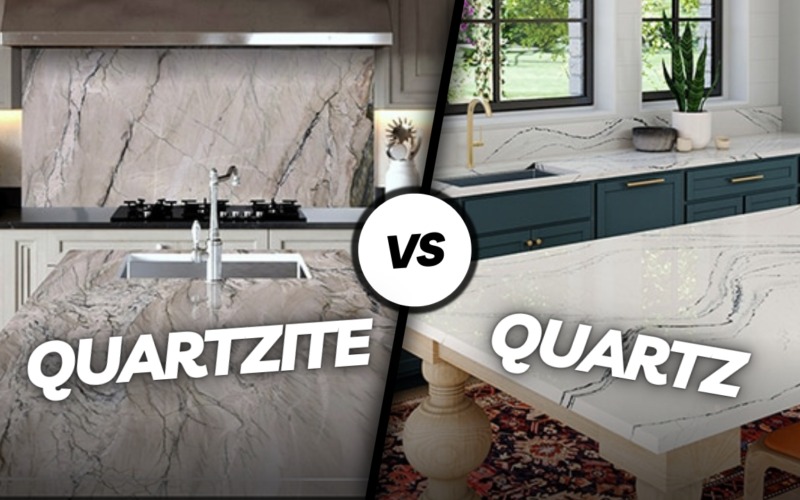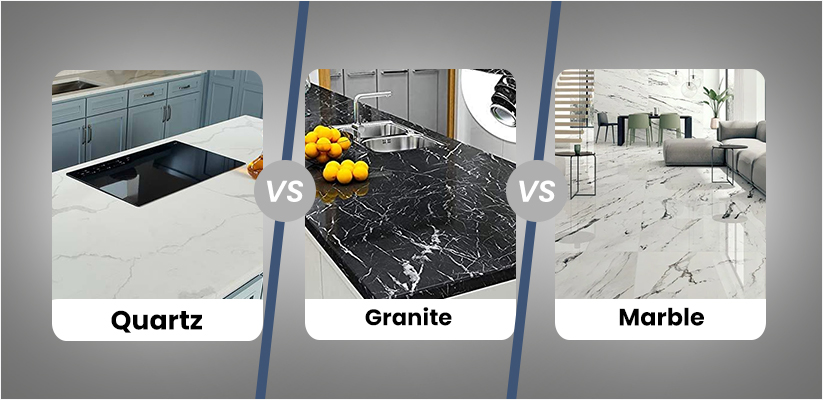
Choosing the Right Countertops: Granite vs Quartz vs Marble
Introduction
When remodeling a kitchen or bathroom, one of the most important and visible decisions is the countertop material. Among the top choices are granite, quartz, and marble. Each material has its strengths, limitations, maintenance needs, and cost implications. To help homeowners make a well-informed decision, this article compares these three materials in depth—covering durability, maintenance, aesthetics, cost, and best use cases.
At Salvation Home Remodeling (shrtarrant.com), we often handle countertop installations during full remodels and kitchen upgrades. We’ll also point out where you can link to your kitchen remodeling or countertop services pages.
Countertop Material Overview
Before diving into comparisons, here’s a quick summary of each material:
-
Granite is a natural igneous stone. It’s durable, heat-resistant, and often requires periodic sealing.
-
Quartz (engineered stone) is man-made—composed of about 90% natural quartz and resin binders. It is non-porous and low-maintenance.
-
Marble is a metamorphic stone known for classic beauty and veining but is softer and more porous than granite and quartz.
These basic facts set the stage for deeper comparison.
Durability & Hardness
Durability is key to choosing a good countertop. Here’s how the three compare:
Granite
Granite is strong, heat-resistant, and reasonably scratch-resistant. It handles hot pans better than most engineered stones. However, since it’s natural, some slabs are more porous or flawed, so sealing is necessary.
A study by the Natural Stone Institute suggests that well-maintained granite countertops can last decades.
Quartz
Quartz is engineered to enhance durability. It’s non-porous, so it resists staining, bacteria growth, and liquid absorption. Because it contains resin, it’s less tolerant of extreme heat—prolonged contact with hot pans may cause discoloration.
Quartz also ranks higher on the Mohs hardness scale compared to marble, making it more resistant to scratches. (Engineered stone resources note that quartz has hardness ~7 vs marble’s ~3.)
Marble
Marble is more delicate. It’s more prone to scratching, chipping, and staining, especially from acidic substances like lemon, vinegar, or tomato. Its porosity demands frequent sealing. In general, marble is better suited for lower-traffic or decorative areas rather than heavy-use kitchens.
In short: granite and quartz are more durable; marble offers elegance but requires more care.
Maintenance & Care
How much work is needed to keep the countertop looking good?
Granite
-
Requires sealing (usually once a year or per the manufacturer).
-
Clean with mild soap and water; avoid harsh cleaners.
-
Wipe spills quickly to avoid stains from wine, oils, or colored liquids.
Quartz
-
Virtually maintenance-free—no sealing needed.
-
Just wipe with a soft cloth and mild cleaner.
-
Use trivets or hot pads since the resin can be damaged by extreme heat.
-
Avoid harsh chemicals (bleach, strong acids) which may degrade resin over time.
Marble
-
Needs sealing more frequently (every few months or per manufacturer).
-
Be very careful with acidic spills.
-
Use cutting boards and avoid dragging heavy items across its surface.
-
Use pH-neutral cleaners only.
Quartz is easiest to maintain, granite falls in the middle, and marble demands the most attention.

Cost Comparison
Cost varies by region, finish, slab type, and installation complexity. Here are current U.S. cost ranges:
-
Granite: ~$40 to $100 per square foot installed (some exotic granite may go higher).
-
Quartz: ~$50 to $120 per square foot installed.
-
Marble: Typically more expensive, with full installations starting around $125 per square foot and up.
Sources: Home Depot cost guide, GW Surfaces comparison, MSI surfaces costing range, and others.
When budgeting, include slab, labor, edge finishing, installation, cutouts (sink, stove), and removal of existing countertop.
Aesthetic & Design Flexibility
Design matters as much as durability.
Granite
-
Natural patterns—no two slabs are exactly alike.
-
Earthy tones, flecks, and speckles are common.
-
Good for rustic, traditional, and transitional styles.
Quartz
-
Very consistent look—manufactured for uniformity.
-
Wide palette of colors, including those mimicking marble veining.
-
Ideal for modern, minimalist, or transitional decor where uniformity is desired.
Marble
-
Distinctive veining and classic beauty.
-
Strong statement, often used in luxury or high-end designs.
-
Works well in bathrooms, accent walls, and surfaces with lighter use.
Quartz offers design predictability; granite gives natural uniqueness; marble gives timeless elegance—but at a maintenance cost.
Use Cases & Recommendations
Based on room function, traffic, and style, here’s when to choose each:
-
Kitchen: Quartz or granite (quartz for lower maintenance; granite for heat tolerance).
-
Bathroom vanity tops: All three can work, but quartz or granite are safer for durability.
-
Coffee bar or wet bar: Quartz works well because it handles frequent use and spills.
-
Decorative surfaces or dessert counters: Marble is acceptable if it won’t receive abuse.
-
Bar top or edge with hot pans: Granite is safer due to heat resistance; quartz needs protection.
For your site, link phrases such as “kitchen remodel services” or “countertop installation services” to your remodeling or services pages.
Environmental & Health Considerations
-
Granite & Marble: Natural materials, quarrying has environmental impact.
-
Quartz: Some use recycled content and more efficient fabrication; less waste.
-
Sealing chemicals: Some sealants contain VOCs—choose low-VOC options.
-
Hygiene: Quartz is non-porous, so less risk of bacteria growth compared to natural stones.
Installation & Edge Profiles
The skill of installation affects performance and look.
-
Align seams carefully—especially in quartz and granite.
-
Use proper substrate and support to avoid sagging.
-
Edge profiles (eased, bullnose, ogee) affect cost and aesthetics.
-
Consider sink and stovetop cutouts, backsplashes, and splash edges in your plan.
Longevity & Warranty
-
Granite: With care, can last 30+ years; many showrooms back slabs with warranties.
-
Quartz: Many manufacturers offer lifetime residential warranties.
-
Marble: Durability is lower, but with proper maintenance it can last decades in low-use areas.
Data from stone and fabrication industry sources support these longevity estimates.
Challenges & Potential Issues
-
Chipping at edges or cut-outs
-
Seam visibility especially in light-colored stones
-
Heat damage to quartz if exposed to very hot cookware
-
Staining or etching in marble
-
Slab variation in natural stone—ensure color match
Work with experienced fabricators and installers to reduce risk.
How We Can Help
At Salvation Home Remodeling, we offer:
-
Countertop consultation & selection
-
Fabrication & installation by professionals
-
Design advice matching your style and use-case
-
Integration in full remodels (kitchen, bath, bar areas)
Link key terms like “kitchen remodeling”, “bathroom remodeling”, and “countertop installation service” to your services pages.
Cost vs Value: What Makes Sense
Consider:
-
Budget ceiling: Decide max cost per sq ft.
-
Room demands: Kitchens need durability, bathrooms may favor elegance.
-
Long-term cost of maintenance
-
Resale value: Quartz and granite often offer better balance for resale markets than marble.
Choose the material that gives you the best mix of performance, style, and longevity.
Frequently Asked Questions (FAQs)
Q: Which countertop is best overall?
A: For most homeowners, quartz is a strong all-around choice—low maintenance, durable, and stylish.
Q: Does marble scratch easily?
A: Yes, marble is softer and can etch with acidic spills and abrasives.
Q: Do granite countertops require sealing?
A: Yes, typically once a year or per manufacturer instructions.
Q: Can quartz handle hot pans?
A: Quartz is resistant, but prolonged exposure to high heat can cause discoloration—use trivets.
Q: Which option suits resale?
A: Quartz and granite tend to perform better in resale due to lower maintenance and durability.
Conclusion
Choosing between granite, quartz, and marble comes down to trade-offs in durability, maintenance, style, and cost. Quartz offers ease, granite gives heat strength and natural beauty, and marble lends luxury if cared for properly.
When you’re ready to select and install countertops, Salvation Home Remodeling can guide you to define your needs, select slabs, and coordinate professional installation. Let us help you create surfaces that are both beautiful and practical.
Ready to choose the perfect countertops for your kitchen or bathroom remodel? Contact Salvation Home Remodeling today for expert guidance and professional installation in Fort Worth, TX.
